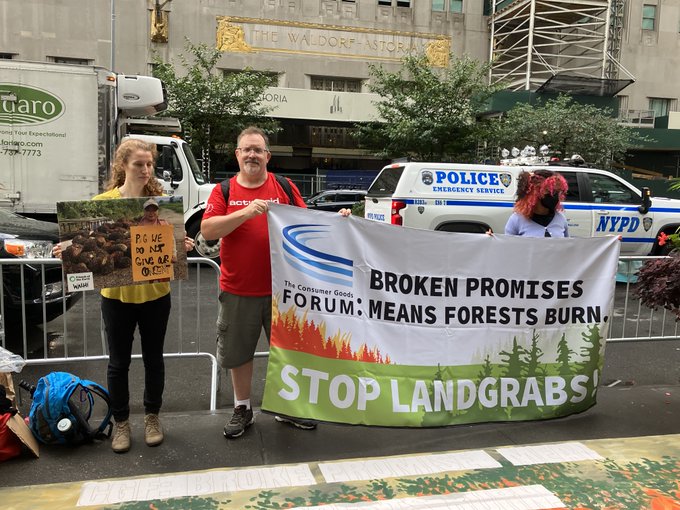- Blog
- Forests
- Deforestation Free Legislation
- Will consumer goods companies ensure justice for communities that have been robbed of their lands and livelihoods?
Will consumer goods companies ensure justice for communities that have been robbed of their lands and livelihoods?
by Gaurav Madan, Senior Forests & Lands Campaigner

Donate Now!
Your contribution will benefit Friends of the Earth.
Stay Informed
Thanks for your interest in Friends of the Earth. You can find information about us and get in touch the following ways:
The age-old axiom asks: “If a tree falls in a forest and no one is around to hear it, does it make a sound?”
Indonesian forest-dwelling communities have a question of their own: “If a destructive palm oil company is suspended by consumer goods giants for land grabbing and human right abuses, will we finally get our land back?”
This is exactly what farmers in the provinces of Central and West Sulawesi want to know after six of the world’s largest consumer goods companies suspended Astra Agro Lestari (AAL), Indonesia’s second largest palm oil producer, from their supply chains. The suspensions by L’Oréal, Nestle, Hershey’s, Procter & Gamble, Colgate-Palmolive and Danone follow a report by WALHI and Friends of the Earth U.S. earlier this year and an independent investigation confirming that AAL subsidiaries are operating on communities’ lands without their consent and criminalizing environmental human rights defenders.
But suspending AAL – whether partially or entirely – is a means, not an end. Communities on the frontlines of AAL’s palm oil operations have had their land forcibly taken. Local farmers’ livelihoods have suffered from soil and water pollution due to the improper disposal of palm oil waste. And those who have resisted the violent takeover of their lands have been repeatedly thrown in jail. Companies that enabled these abuses – including multibillion consumer giants that source from AAL – have an obligation to ensure that justice is now delivered through remedy for harm done.
Communities impacted by AAL’s operations are demanding land back that was taken without their consent. They are calling for compensation as restitution for the loss of their livelihoods. And they want a formal apology.
Consumer goods companies have an important role to play here. After all, these companies for years have published policies committing to end deforestation, respect communities’ land rights, and uphold human rights in their supply chains. Unilever states in its policies that it has “zero tolerance for land grabbing” – yet maintains sourcing from AAL. Notably, AAL has refused to acknowledge the reality on the ground, calling the documented evidence of ongoing land grabbing “baseless.”
Despite these paper commitments and promises of transparency and traceability, these companies’ business operations and supply chains continue to drive the worst aspects of the climate crisis. In 2010, the Consumer Goods Forum – a consortium of the world’s largest retailers, including many that source from AAL – pledged to achieve zero-net deforestation by 2020. But 2020 came and went, and they failed. Meanwhile, deforestation and associated land conversion – largely driven by the production of industrial agricultural commodities – is still the second largest contributor to greenhouse gas emissions causing the climate emergency.
Large retailers and brands that market everyday household products continue to source from agribusinesses that violently evict Indigenous Peoples from their ancestral lands and criminalize and attack defenders who stand up for people and planet. A recent report documented that 200 people were killed in 2021 for protecting their land and human rights, with agribusiness being one of the deadliest sectors.
In this larger context, the recent decisions to suspend AAL are an important first step toward accountability, but by no means should be the end of companies’ responsibility. Consumer companies should use their leverage to push for meaningful grievance redress and conflict resolution. They should also address their role in enabling the destruction of the world’s last standing forests and escalating an epidemic of violence against frontline communities and defenders.
Keeping the world’s remaining forests standing will require companies, investors and governments alike to respect the rights of Indigenous Peoples and local communities. Despite only comprising about 5%of the world’s population, Indigenous Peoples’ territories hold approximately 80% of the world’s biodiversity, which is essential for maintaining healthy ecosystems that sustain life across the planet.
As for the sounds of the forest? If we want to make sure future generations can hear them, it is imperative that we shift away from the dominant model of agricultural production, which too often is predicated on environmental destruction and land theft for the expansion of monoculture plantations. Again, consumer companies, as well as policymakers and powerful investors, have a vital role to play. They should begin by articulating timebound plans for a managed, just transition away from industrial agribusiness.
